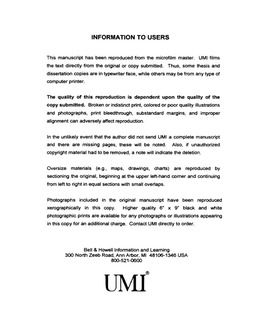| dc.contributor.advisor | Cottom, Daniel, | en_US |
| dc.contributor.author | Mcclinton, Jennifer Anne. | en_US |
| dc.date.accessioned | 2013-08-16T12:18:07Z | |
| dc.date.available | 2013-08-16T12:18:07Z | |
| dc.date.issued | 2001 | en_US |
| dc.identifier.uri | https://hdl.handle.net/11244/280 | |
| dc.description.abstract | In this dissertation, I examine several postcolonial texts that rewrite or revise an earlier English work. My objective here is to uncover the reasons why this is such a popular method of writing for postcolonial authors and how those reasons are revealed. Postcolonial rewrites work because they are able to accept the influence of English literature on native culture. At the same time, they reject stereotypes or misrepresentations that might have been created by that literature. In addition, these rewrites open up the earlier work for alternative readings that have the potential to change forever the way the first work is interpreted and received. Pairs of works I examine include Wole Soyinka's Opera Wonyosi (1979) and John Gay's The Beggar's Opera (1720 Anita Desai's Where Shall We Go This Summer? (1975), Robertson Davies's Tempest-tost (1951), George Lamming's Water with Berries (1973) and William Shakespeare's The Tempest, Jean Rhys's Wide Sargasso Sea (1967) and Charlotte Bronte's Jane Eyre (1837), Derek Walcott's Pantomime (1978) and Daniel Defoe's Robinson Crusoe (1719), Salman Rushdie's Midnight's Children (1981) and Laurence Sterne's Tristram Shandy (1759), Peter Carey's Jack Maggs (1997) and Charles Dickens's Great Expectations (1861). I also examine several poems be William Butler Yeats in terms of how they rewrite Celtic myths and how that project compares to James Joyce's Ulysses, itself a rewrite of Homer's The Odyssey. | en_US |
| dc.description.abstract | Re-writing and re-reading traditional European texts from a post-colonial position is a powerful method of dramatizing the oppositional relationship between the colonizer and the colonized. By using Western canonical texts to rewrite, write back to, or write through the European canon, post-colonial writers can foreground the experiences, the history, and the culture of the once dominated society while at the same time recognizing the effects colonization has had in shaping and reshaping them. Appropriating works such as The Tempest, Robinson Crusoe, or Jane Eyre allows postcolonial writers to treat the European literary tradition in a variety of ways. They may undermine it, appropriate it, or venerate it, but in any case they will not lose their own subjectivity in the process. | en_US |
| dc.format.extent | xvii, 254 leaves ; | en_US |
| dc.subject | Decolonization in literature. | en_US |
| dc.subject | Colonies in literature. | en_US |
| dc.subject | Literature, English. | en_US |
| dc.subject | English literature History and criticism. | en_US |
| dc.title | Rewriting empire: Rewriting canonical British texts from a postcolonial perspective. | en_US |
| dc.type | Thesis | en_US |
| dc.thesis.degree | Ph.D. | en_US |
| dc.thesis.degreeDiscipline | Department of English | en_US |
| dc.note | Source: Dissertation Abstracts International, Volume: 62-02, Section: A, page: 0585. | en_US |
| dc.note | Major Professor: Daniel Cottom. | en_US |
| ou.identifier | (UMI)AAI3004873 | en_US |
| ou.group | College of Arts and Sciences::Department of English | |
